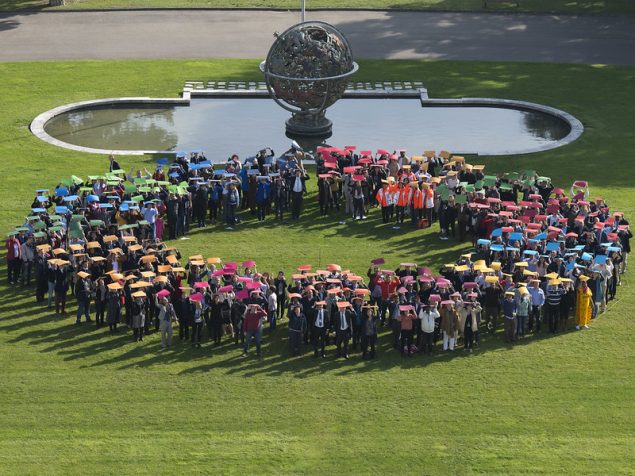Chapter Two: The Convention in detail
OBLIGATIONS OF STATES PARTIES UNDER THE CONVENTION
As affirmed in article 4 of the Convention, a Government that ratifies the Convention agrees to promote and ensure the full realization of all human rights and fundamental freedoms for all persons with disabilities, without discrimination of any kind. The box below details the concrete actions that States must take in order to meet this obligation.
Each State must take measures to realize economic, social and cultural rights progressively, using the greatest amount of available resources to do so. This obligation, commonly referred to as progressive realization, acknowledges that it often takes time to realize many of these rights fully, for example, when social-security or health-care systems must be created or improved. While progressive realization gives States parties, particularly developing countries, some flexibility in achieving the objectives of the Convention, it does not absolve States parties of the responsibility to protect those rights. For example, a State must not forcibly evict a person with a disability, arbitrarily withdraw social-security protection or fail to introduce and respect the minimum wage.
Unlike economic, social and cultural rights, civil and political rights are not subject to progressive realization. In other words, States must protect and promote these rights immediately.
ACTIONS TO BE TAKEN BY STATES PARTIES
Adopt legislation and administrative measures to promote the human rights of persons with disabilities.
- Adopt legislative and other measures to abolish discrimination.
- Protect and promote the rights of persons with disabilities in all policies and programmes.
- Stop any practice that breaches the rights of persons with disabilities.
- Ensure that the public sector respects the rights of persons with disabilities.
- Ensure that the private sector and individuals respect the rights of persons with disabilities.
- Undertake research and development of accessible goods, services and technology for persons with disabilities and encourage others to undertake such research.
- Provide accessible information about assistive technology to persons with disabilities.
- Promote training on the rights of the Convention to professionals and staff who work with persons with disabilities.
- Consult with and involve persons with disabilities in developing and implementing legislation and policies and in decision-making processes that concern them.
Obligations to respect, protect and fulfil
Implicit in the Convention are three distinct duties of all States parties:
The obligation to respect – States parties must refrain from interfering with the enjoyment of the rights of persons with disabilities. For example, States must not perform medical experiments on persons with disabilities without their consent or exclude a person from school on the basis of a disability.
The obligation to protect – States parties must prevent violations of these rights by third parties. For example, States must require private employers to provide just and favourable working conditions for persons with disabilities, including by providing reasonable accommodation. States must be diligent in protecting persons with disabilities from mistreatment or abuse.
The obligation to fulfil – States parties must take appropriate legislative, administrative, budgetary, judicial and other actions towards the full realization of these rights (see box above).
Examples of how these obligations might be practically fulfilled are provided in the box below.
THE OBLIGATIONS TO RESPECT, PROTECT AND FULFIL: HOW THEY MIGHT BE TRANSLATED INTO ACTION
Freedom from torture
- Respect: the State must not subject a person with a disability to torture and other cruel, inhuman or degrading treatment in a State-run prison.
- Protect: the State must ensure that privately run prisons or psychiatric institutions do not practise torture and similar practices on persons with disabilities.
- Fulfil: the State must ensure that prison officers and health professionals are given adequate training and information so that the human rights of persons with disabilities are respected.
The right to health
- Respect: the authorities must not undertake medical experimentation on a person with a disability without his/her free and informed consent.
- Protect: the Government must ensure that private health-service providers do not discriminate against or withhold health care from someone on the basis of disability.
- Fulfil: the Government must increase the availability of quality and affordable health care for persons with disabilities.
Freedom of expression
- Respect: the State must not withhold information or stop a person with a disability from freely expressing his/her views.
- Protect: the State must prevent private entities from prohibiting a person with a disability from freely expressing his/her views.
- Fulfil: the State must facilitate the use of sign languages, plain language, Braille, and augmentative and alternative communication in official interactions.
The right to education
- Respect: school authorities must not exclude a student with a disability from education on the basis of disability.
- Protect: the State must ensure that private schools do not discriminate against a person with a disability in their education programmes.
- Fulfil: the State must ensure that free secondary education is progressively available to all, including persons with disabilities.
The right to work
- Respect: the State must respect the right of persons with disabilities to form trade unions.
Protect: the State must ensure that the private sector respects the right to work of persons with disabilities. - Fulfil: the State must provide vocational training, with available resources, to persons with disabilities.
Next – Chapter Two: Comparing The Convention to other human rights treaties




